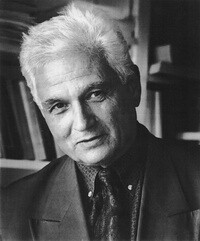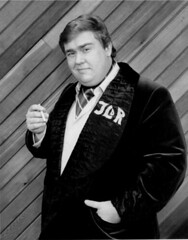Since I seem to be "on a tear" with movie criticism and how it relates to fiction and literature, I will continue on this "unstoppable roll" of brainy dialectic that you will drink up like a skid row drunk sopping up the last drops of a bottle of Boone's Farm Strawberry Kountry Kwencher.
A couple of weeks ago, Wife, Friend of Wife, and I went to see a French movie called "Cache." The movie opens with an extended, static shot of a Parisian home. Two hours later, the movie ends with an extended, static shot of a Parisian lycee. In between, videotapes were sent of that same Parisian home to the couple that lives there, as well as awings of a beheaded rooster, and a lot of not-groovy flashbacks.
"That happened," Wife said.
Derrida Does D
We "got" "Cache," but only in the sense we understood the events on the screen. The movie's central conceit -- who sent those damn videotapes? -- is never revealed, at least overtly. Wife and I went home and surfed for answers, and read about 50 different interpretations of what we'd just seen, from the personification of France's blind, evil treatment of Algerians (OK, I can buy that, being that the characters yakked about this) to the possibility that all the characters are dead and we've just witnessed a dream, which, if true, means the filmmaker has an I.Q. of 37.
(Now, I know that each and all French intellectuals will say they understood "Cache" completely, but they’d rather go on a diet of Vegemite than admit otherwise.)
Admittedly, interpretation is not my strong suit. My powers of reading and interpreting literature are as limited as my ability to figure skate, fly an F-15, or cook, a skill of which my talents are so limited that I find it a triumph if I can just make it to the point where I get to fuck up. Like when I manage to burn a vat of boiling water.
And yet…and yet I was an English major, and did pretty damn good. How, you ask? What was Bookfraud's huge, compelling secret?
Now, listen closely, especially for all of you under the age of 18, and thinking that English could be The College Major For You. This extremely valuable insight that will make your grades rise, cut down on your workload, and has 50% more whitening power than the other leading toothpaste.
Here it is: take a relatively esoteric idea, apply it to literature, and write the same paper about it, over and over (with different professors on different writers, of course). Your academic patrons will love you, because he or she probably has never seen the pairing of, say, subjunctive reality and Aeschylus, or evolutionary psychology and Saul Bellow. And if they have seen such a pairing, they'll at least think you're grad student material. Or that you didn't write a paper that began, "In Milton's 'Paradise Lost,' there is the interesting topic of Satan."
Me, I rode a horse called Entropy. Entropy is the second law of thermodynamics, which I don't understand well enough to explain, but that I "found" in just about every great author and work of literature ever written in the English language.
Entropy in Marvell, Marlowe, Donne. Entropy in the sisters Bronte. Entropy in Joyce, Wolfe, Faulkner, and even Hemmingway. Entropy in everyone except Thomas Pynchon, who wrote a story called “Entropy.” Every paper that I wrote containting the word "entropy" in the title got an "A." Damn, I was smart.
But beware, boys and girls. This doesn't work with everybody. In particular, watch out for those wacky profs who are in thrall to Really Fucking Smart French Philosophers. (Yes, it's those French again.)
Take, for example, an English class I took that examined the Oedipus myth through literature, starting with the Famous Original Dad Killer and Mom Diddler himself to Hamlet to Faust and so on. The teacher was a dyed-in-the-wool deconstructionist, which means you analyze all text in minute detail, down to the letter. Being a deconstructionist also means that when you were writing your dissertation, Derrida, Foucault, and a bunch of other French philosophers flew over from Paris and raped you.
This particular professor was a gentle man, soft-spoken and soft-bodied, but he became quite animiated when he got all textual on us. For instance, the first words Hamlet utters are "A little more than kin and less than kind," a nice pun on his whole messy family situation. Or so I thought. No, the teacher says, the real meaning of that is the difference between "kin" and "kind," that being the letter "D," which he drew with a grand flourish on the chalkboard.
And what does "D" indicate? he asked, as if it were ever so obvious. Us teenage, corn-fed Midwesterners tried our best. "Death." "Denmark." "Disco." "Devo." Nope. The "D," Professor Softie said, stands for "Deus," indicating Hamlet's disconnection between the corporeal of his literal world and that of the spiritual, internal storm that makes him want to kill his uncle and bed his mother.
Oh, of course.
So, the moral of this rambling, pointless typing exercise is (and coming from someone who absolutely loves la France): if you watch a French movie, take a class from a teacher who loves French philosophy, or are considering that vacation in LaCôte d'Azur, just remember one thing. We now call them Freedom Fries.
Saturday, February 18, 2006
How to Be an English Major
Subscribe to:
Comment Feed (RSS)


|